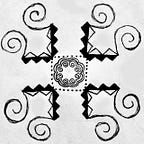Lately I have been thinking about how to be a better writer, how to make my voice heard, and how to make a difference. Although some of these thoughts may sound far-reaching, I’ve always wanted to write content that other Hmong folx could identify with. For example, I’ve read content by non-Hmong folx about their experiences with mental illness, but I would think about how and if it would be different if a Hmong person had written it.
What kinds of personal experiences would a Hmong person allude to in order to detail their feelings? What Hmong cultural factors may or may not have played a part in their experiences? Sometimes, knowing that the writer is of the same ethnicity as you can make you feel less lonely within your respective community; it can feel as if you are not invisible within this sea of diversity. But this shouldn’t imply that other stories with different identities can’t do the same job. It is merely recognizing the importance of representation.
I’ve been researching, then, ways on how to be a better writer and a lot of the advice given is to make your story relatable. I think I understand this to a degree: make others see themselves in your story, create a sense of, “Hey, me too!” At the same time, the perfectionist in me is looking for numbers as validation of successful writing. But the rational side of me is trying to remind myself that quantity should not define my value.
I guess what I contemplate about the most is writing for a mainstream online audience that may be new to, or unconformable in understanding the ways in which my inseparable identities in being: Hmong, womxn, daughter, child of refugees, etc, are important and, arguably, part and parcel to the context of my writings.
For example, I enjoy reading stories from The Mighty, an online platform where people share their experiences and thoughts on navigating mental illness(es). However, I don’t know if I would publish on there. A lot of the stories I read seem to come from a White lens and more often than not, many popular mainstream platforms seem to work through a White lens. When I say this, what I mean is these platforms seem to write from a place where they may not have to think about how racialized or marginalized identities may play a role in one’s stories. This isn’t to say these platforms are not valuable. I still read from The Mighty and find worthy connections. This only means that these platforms may not be the best home for my stories. So, I want to contribute to platforms that would better recognize and complement my complex, intersecting identities. And if that means not contributing to more popular and mainstream platforms like The Mighty, then that’s okay.
So, don’t be afraid to not be mainstream (online). What matters is writing your truth and finding a place where your story will be considered and read in the ways in which you hope it will be. And sometimes, that may mean creating that space, like what the editors have done with maivmai. And so, here at maivmai is where I and many others have found a home for our stories.
